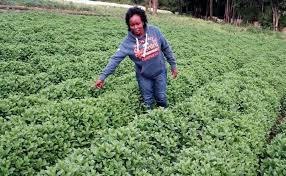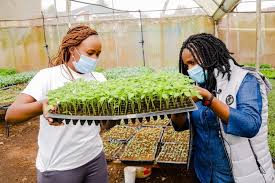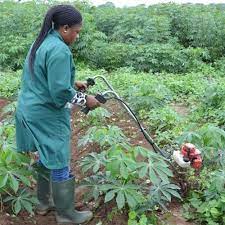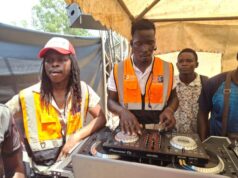
Janet Onganga makes over a million shillings a year from dairy, aquaculture, and horticulture food production, which has garnered her three awards in the previous 6 months.
Investing School Fees in Agribusiness
In December of the same year, Chebet, a C- graduate of Kiptere Mixed Secondary School, married Julius Onyancha. Her parents gave her KES 300,000 to enable her to enrol in a teaching course at a college of her choice, but she instead decided to create a farm with the money.
She started her dairy farm using the KES 140,000 she received from her parents for education expenses. She invested around KES60,000 in two Friesian and Jersey heifers, KES 10,000 in transportation, and KES 90,000 in a cowshed.
Chebet noted, “I started with dairying because I needed organic manure.” “I had a brilliant idea to utilize the leftover funds to build aquaculture and horticulture farms because manure is beneficial to algae in fish ponds and crop growth.”
“It would be more expensive to buy manure from other farms than to use compost excrement from the cows’ shed.”
Pursuance of Dreams

She defied her parents’ expectations for her to pursue a career as a teacher after high school and instead chose to be a farmer, a decision that has garnered her three honours and other distinctions in just six years.
When her parents found their daughter had not registered in any institution, they were upset. “My parents were enraged by my decision, and they stopped contacting me or sending me texts,” Chebet stated.
Investment Returns
She currently has eight cows, two of which are in the process of giving birth. She milks 10 litres every day from two cows for KES60 per litre. She earns around KES18,000 per month and KES100,000 per year after spending KES16,800 on food.
She prepares silage from Napier grass, maize stalks, and molasses, which she feeds to the cows to combat the country’s present drought.
Good Work is Rewarded

Agricultural inspectors from the Nyamira County Government noticed her milk production efforts and granted her a certificate of recognition after assessing her work and determined that she had a solid understanding of farming.
“The Nyamira County Ministry of Agriculture gave me total approval after staff from the ministry came and looked at what I was doing and asked me questions to determine whether I had any agricultural expertise,” Chebet claimed.
This encouraged her, and she continued to invest around KES200,000 of the profits from her dairy farm to build two 300-meter-square fish ponds.
She then invested KES10,000 on 2000 five-shilling tilapia fingerlings.
Profitability

Chebet’s second significant agribusiness on her property is a greenhouse, which has earned her a state medal and praise as well as KES300,000 every year.
“My four greenhouses keep me the busiest, especially while I’m picking tomatoes.” She stated, “I put KES450,000 into tomato production and made over KES750,000.”
She also grows butternuts on a portion of her property. She receives about five fruits per butternut plant, and each fruit costs KES20, therefore she anticipates making KES100,000 from her 1000 plants. This, along with the proceeds from vegetable sales, totals KES181,000.
Her garden, which has grown into a regional agricultural centre, now attracts other farmers from the region for benchmarking as well as university students from the University of Hong Kong (HKU) in China who come to perform case studies with other students and professors from the University of Nairobi (UoN).
“We’ve built up an office in our property where we can receive guests and farmers while also keeping care of our agricultural records to avoid any involvement with our family concerns,” Chebet stated.
Encouragement and Inspiration
Her parents are now envious of her agricultural success and support her. “They’ve come to respect my decision and have become ardent supporters of mine.”
Chebet participates in agronomic seminars sponsored by the county’s agricultural ministry and World Vision, an organization that works with children, families, and communities throughout the world to help people achieve their full potential by addressing poverty and injustice.
Her husband, who works as a procurement officer at Nyamira County’s Nyamusi district office, also assists her financially and with knowledge.
What variables contribute to the success of agricultural investments in Kenya? And how many rural people profit from investments in the long term to earn a livable wage?






